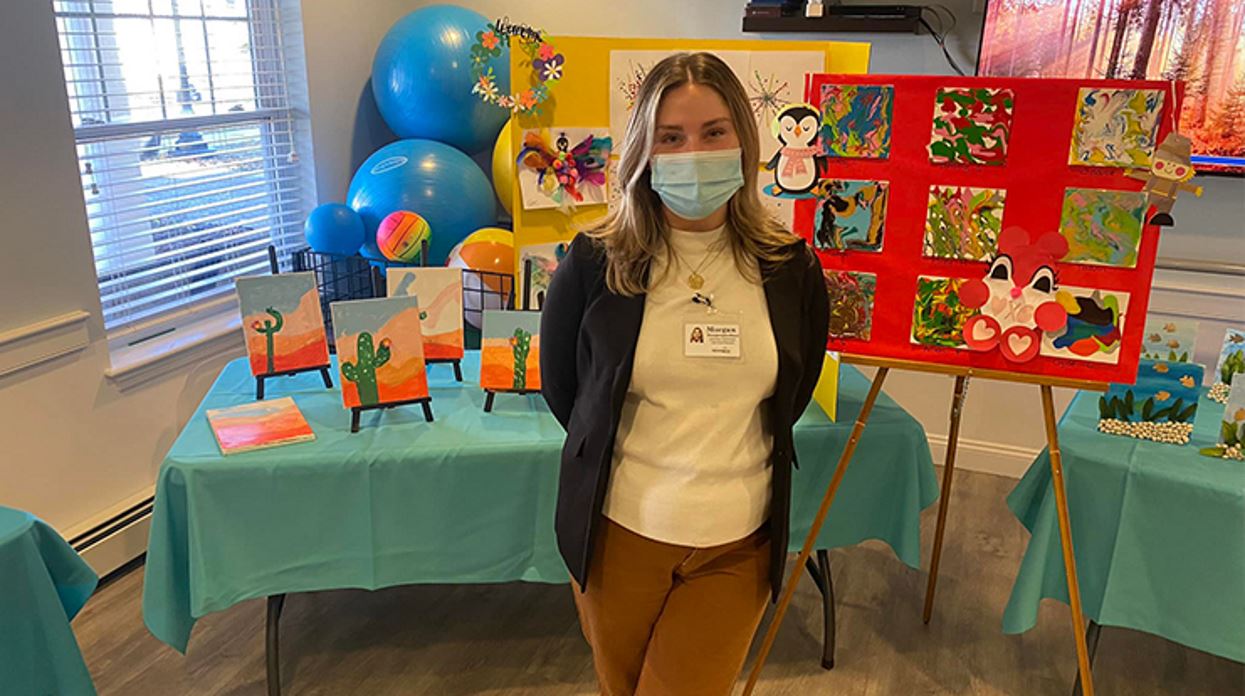
Occupational Therapy Student Thinks Beyond Her Field with Art Therapy

Occupational Therapy student Morgan Hoopengardner started an art therapy group for seniors at an assisted living facility.
Morgan Hoopengardner, Master of Science in Occupational Therapy '22 candidate, was inspired after taking OTH 511 Practice Engagement: Therapeutic Groups, a course taught by Douglas Simmons, PhD, OTR/L, FAOTA, focused on how to run and facilitate groups.
“I was inspired by the class and I wanted to do something somewhat related to occupational therapy and I wanted to use my skills in some way,” she says.
Hoopengardner started to look for jobs online where she would be able to lead groups and found a posting for a Life Enrichment Assistant position at the assisted living facility, The Huntington at Nashua in Nashua, NH.
“They were looking for someone to lead exercise groups or an art group,” she says. “They wanted to engage their residents.”
As a creative person who has been painting since the 5th grade, Hoopengardner gravitated to the idea of hosting an art group with an art show at the end of her time.
“I knew I would be moving back to New Jersey to do my Level 2 field work but I thought that the idea of having an art show where you could invite family and friends to display the art would be a way of making an experience where it would bring the Huntington community together in some way,” she says.
As a part time job, she went to The Huntington three days a week for around 10 hours a week. She would also prepare for the art group by creating an example of the artwork before the group meeting so that she could focus her attention on the residents.
“I could still give individual attention to each resident, and kind of grade it upward or down, depending on their skill level,” she says. “I had to find that balance of pushing them a little bit, but not too much to the point where they get frustrated and don't want a come. So my goal was to find that just right challenge for each resident.”
She explained that the residents had varying levels of cognitive difficulties and conditions so she was mindful about what projects to choose.
“We did a lot of different projects . . . we did abstract art which was great because for the residents who had dementia or Alzheimer’s, it can be hard for them to cognitively process the steps of say, a nature scene,” she says.
As part of an effort to engage as many residents as possible, she created projects of different skill levels from making Christmas wreaths to abstract art to painting nature scenes on canvas.
“Art brings a lot of meaning to people, it gives them the opportunity to create something unique,” she says.
She also explained that as an occupational therapist, the use of art can play a big role in improving body function.
“We’re working on visual motor skills, visual perceptual skills, processing skills like multi-step direction, executive functioning,” she says. “There’s also research showing that for dementia or Alzheimer’s disease patients – there’s a slower rate of decline when you keep your mind and brain active.”
Hoopengardner explained that while the goal of the art group was to bring people together and socialize, she did see improvements in skill levels over time.
“I definitely saw improvements in fine motor skills but not a lot for processing skills because a lot of the residents are further along with some of the diseases that they have,” she says.
As an occupational therapist, working with the Huntington community opened her eyes to the symptoms of dementia and Alzheimer’s disease.
“When I first began working there, I didn’t understand how to speak to people who had dementia, and learning that ‘just right’ challenge was really hard for me because at first, I felt like I was pushing too much,” she says.
Hoopengardner says that her group class at MCPHS really prepared her for the experience and she feels that she really made a difference in the Huntington community.
“It was really successful and the Huntington is going to carry on what I did when I left there which is awesome.”
In the full-time, two-year Master of Science in Occupational Therapy program at MCPHS–Manchester, students work alongside professional experts in advanced simulation laboratories and gain experience in a variety of clinical settings.
More University News
New Life Sciences Degree Prepares Students to ‘Hit the Ground Running’
The program transforms education into opportunity, one course—and one student—at a time.
MCPHS 2025: A Year in Photos
Our photos from 2025 show connection, community, and celebration.
‘Purpose and Passion’: MCPHS Manchester Students Showcase Research
From pharmacy deserts to Gen Z learning strategies, student researchers explored timely issues shaping the future of healthcare.
This is MCPHS: ‘It’s Really Motivating When You Find the Thing That’s Right for You’
Health Sciences major Emma Borkosky shares her thoughts on getting involved on campus and the formative experiences that shaped her journey into occupational therapy.

